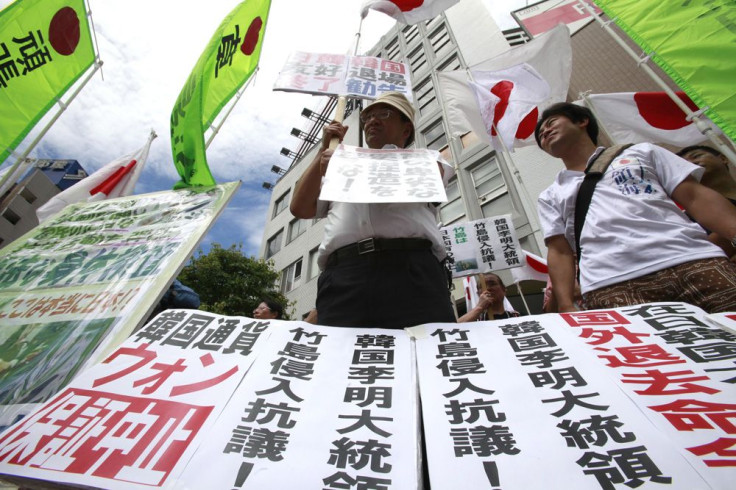Japan-South Korea Territorial Dispute: Economic Relations Likely To Suffer Over Takeshima/Dokdo Islets

South Korea has upped the ante in a territorial dispute with Japan over a couple of islands in the East China Sea known by Koreans as Dokdo, and by the Japanese as Takeshima. The intensifying discord has only added pressure to an increasingly strained economic relationship between Tokyo and Seoul.
According to AFP, South Korea is publishing and distributing 15,000 pamphlets laying claim to the islands to be handed out to embassies overseas as well as to private schools overseas run by embassies or frequented by children of South Korean parents, beginning next month.
The latest move by Seoul comes after Japan celebrated its 10th annual “Takeshima Day,” on Feb. 22, which promotes Japan’s sovereignty over the uninhabited islands, roughly equidistant between the two countries. For several years, Takeshima Day was celebrated without any geopolitical repercussions, but became a point of contention in 2012 when Japan sent a central government official to attend the event. Claims only intensified when the then-president of South Korea Lee Myung-bak made an unplanned visit to the islets the same year.
In protest of the annual event, on Sunday protesters picketed the Japanese embassy in Seoul, calling for Tokyo to recognize South Korea’s claims.
The brochures, titled “The East Sea and Dokdo Islets Seen in Maps and Photos," are in both English and Korean. The Ministry of Education says that the brochures are the first materials to publicize information about South Korea’s historic claims to the area in detail.
According to South Korea’s Yonhap News Agency, Yonhei Matsumoto, the official who was picked to attend this year’s Takeshima Day, expressed concern over the rising tension between Tokyo and Seoul over the islands, calling for a peaceful resolution.
The confrontation may further drive a wedge between the two nations, potentially worsening an already fraying economic relationship. The trend has been going on for years: China replaced Japan as South Korea’s biggest trading partner back in 2003, with Japan only taking in six percent of South Korean exports, compared to its peak of 39 percent in 1973. The dispute between Japan and South Korea may give China further opportunity to intercept economic partnership opportunities with South Korea. And, as the Wall Street Journal noted, a dispute between two staunch U.S. allies both sitting on China's doorstep is worrying Washington.
Japan and South Korea also announced the termination of a 14-year-old currency swap deal on Feb. 23 which allowed each side to acquire dollars by using its own currency during financial emergencies. "A clash of egos between Japan and South Korea resulted in the decision not to renew the accord,” an unnamed official reportedly told local newspaper Asahi Shimbun.
Tensions have also had an effect on soft-power exchanges. Korean pop mmusic and “k-drama” television shows that were previously marketed heavily in Japan have shifted focus to the Chinese audience. Seoul’s popular shopping district Myeongdong used to swarm with Japanese tourists; now the Chinese represent South Korea’s biggest tourist population.
© Copyright IBTimes 2024. All rights reserved.





















